Retinol increases skin cell turnover, and treats acne, dark spots, and hyperpigmentation. Vitamin C fights off environmental stressors and free radicals to give you bright skin, boost collagen production, and tackle uneven skin tone.
Now you want all these qualities together by layering Retinol and Vitamin C one after the other? wait. don’t do that. You will probably look like this.
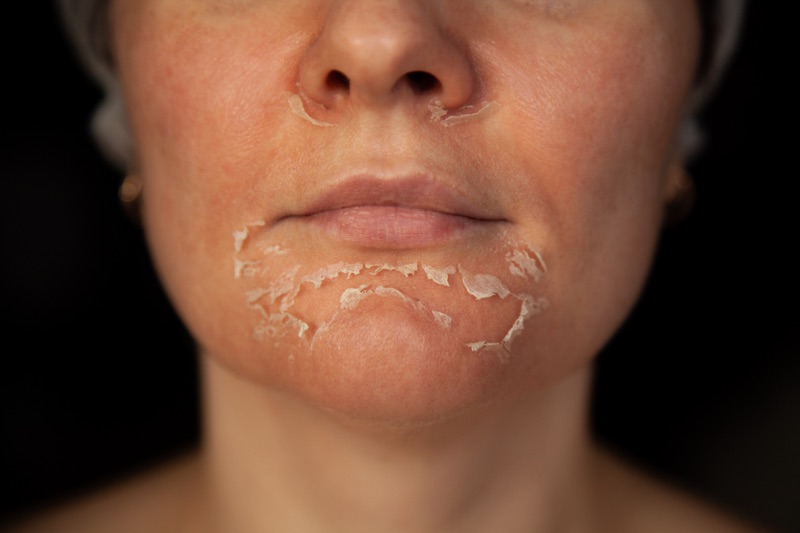
Do Retinol and Vitamin C work well together?
If you mean layering Retinol and Vitamin C or mixing them at the same time then NO, they don’t work together at all. Together, Retinol and Vitamin C will rip off your skin badly!
The science-backed answer is, the PH of Vitamin C is 3.5 which is very acidic & PH of Retinol is around 6 which is alkaline. When you have two ingredients going in completely opposite directions, how can they work for your skin together?
What happens when you mix Vitamin C and Retinol together?
In order for Vitamin C to work on your skin, it has to be in acidic PH, on the other hand, Retinol performs better at basic PH. If combined, Retinol and Vitamin C over-exfoliate the skin, compromising your stratum corneum i.e., the outermost layer of the skin which absorbs or retains skin’s moisture & protects your skin from all kinds of bacteria, dirt & pollutants. As a result, your skin might look red, scaly, patchy, flaky, dehydrated, or rough.
Can you incorporate both Vitamin C and Retinol in your skincare routine in any way?
Yes, you can use both Vitamin C serum and Retinol in your skincare routine, but at different times of the day. Use Vitamin C in the morning and Retinol at night-time before sleeping. This way you can rob all the lovely qualities of Retinol and Vitamin C on a daily basis.
What is Vitamin C & how does it make your skin bright?

Vitamin C in skincare is basically a topical antioxidant & that’s how it prevents all the free radical damage to your skin. Free radical damage is caused majorly by UV radiation. So, your melasma, pigmentation, dark spots, acne scars, and fine lines are all treated using Vitamin C resulting in bright glowing skin. It helps a lot in collagen production which leads to youthful supple skin & with the consistent usage of Vitamin C, you’ll also notice how the problem of stubborn blackheads on the nose starts decreasing. Vitamin C honestly is a must-have in your bathroom cabinet for good skin health!
Meet the complete Vitamin C family, to know what works for you & where not to spend money.
| L-Ascorbic acid | Magnesium Ascorbyl Phosphate | Sodium Ascorbyl Phosphate | Ascorbyl Glucoside | 3-0 Ethyl Ascorbic Acid | Ascorbyl Palmitate | |
|---|---|---|---|---|---|---|
| Description | The most effective & a total gold standard Vitamin C | It can be a support ingredient in your pigment fighting routine but don’t expect anything more. | It can help with tackling acne | Fights off hyperpigmentation & boosts collagen | Helps in Hyperpigmentation | Useless ingredient |
| PH | Under 3.5 | 7 | 7 | 5-8 | 5.5 | Under 3.5 |
| Effective % | 5-20% | 5% | 5% | 2% | 2% | 5-20% |
| Drawback | It is the best. The only drawback could be if it doesn’t suit your skin type. | It does nothing major. It’s only a support pigment fighting ingredient | It’s weakest in collagen boosting production. | Bad antioxidant | Buy it only if you can’t get your hands on any other forms. | Just walk away |
Vitamin C Family
Which ingredients are Vitamin C friendliest with?
- Vitamin E
- Ferulic acid
- Azelaic acid
- Niacinamide
- Hyaluronic acid
- Sunscreen
- Salicylic acid (how to correctly pair, check the article)
Vitamin C packaging matters a lot!
Vitamin C oxidizes quickly if it’s susceptible to sunlight, water & oxygen. Regardless of any form you choose, Stability is the most important. Clear yellowish color is the starting fresh point of Vitamin C, when it turns to turn brownish whiskey color, let it go! Always buy serums in a dark packaging bottle & store them away from sunlight & heat in your bathroom cabinets perhaps.
How to use Vitamin C correctly in your skincare routine?
- Do a patch test first.
- Cleanse your face thoroughly & pat it dry
- Then start with the lowest concentration of Vitamin C serum if you are using it for the first time.
- Don’t mix Vitamin C serum with any other ingredient except the ones mentioned above.
- Just a few drops are enough to cover the whole face & neck
- Layer it with moisturizer followed by sunscreen.
Product Recommendations for Vitamin C Products
Vitamin C Serums:
- DearKlairs, freshly juiced Vitamin C serum
- Drunk Elephant C Firma fresh day serum
- Paula’s choice C15 Super booster
- SkinCeuticals C E Ferulic
- Timeless skincare 20% Vitamin C+ Ferulic acid+ Vitamin E
- Derma-E Vitamin C renewing moisturizer
- Dr Dennis Gross Vitamin C Lactic Dewy Deep Cream
- Paula’s choice C5 super boost moisturizer
- BIOSSANCE Squalene+ vitamin C rose moisturizer
- Murad Environmental Shield Essential C Day Moisture SPF 30 Vitamin C moisturizer
Retinol
Retinol is a derivative of Vitamin A which directly affects our gene expression, regulating all our age-related issues by eliminating old dead skin cells and allowing fresh, young skin cells to come up to the surface. It goes deep into the layers of the skin and exfoliates it from within resulting in clean pores from bacterial growth or sebum, smooth skin texture & clear acne.
Why is Retinol the most researched ingredient?

Because everybody wants to stay young and Retinol does the job by slowing premature skin aging. Yes, it does! Retinol actually builds collagen production and increases the elastin in the skin by working in the deep layers of the skin. Retinol eliminates fine lines and wrinkles, reduces the appearance of uneven skin tone, sagging skin, and improves the protective barrier of the skin with consistent usage.
What is Retinol & what is Retinoid? Are these the same?
It’s a lot of confusion out there with the whole Retinol family. Oh yes, Retinol has a big family and the head of the family is Retinoid. Retinoid has 7 children & Retinol is one of them. When it comes to who’s stronger? Obviously, the father is! Retinoid is 20 times stronger than Retinol. Well, this was the least frightening way I could clear your doubts about these heavily confusing scientific terms.

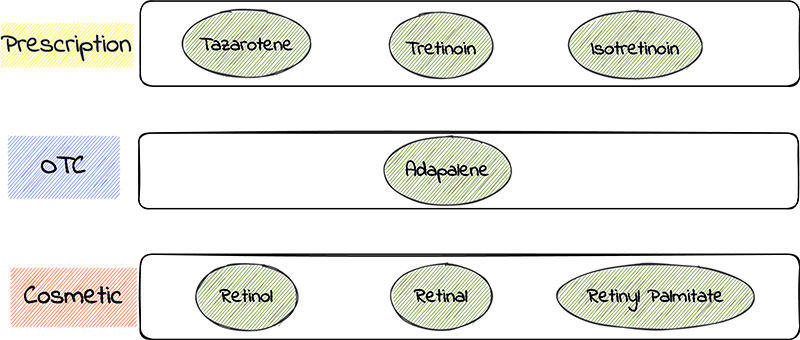
Moving on, nothing this amazing comes so easy peasy. There are rules to follow when you’re starting your Retinol journey otherwise Retinol has all the potential to backfire on the skin’s health!
Retinol Rules to Follow in your skincare routine
- Use Retinol only at night.
- Do not use it very close to your eyes, mouth, or nose.
- Never exceed the quantity of more than a pea size.
- Don’t forget to apply it on the neck as well.
- Don’t apply it on damp skin. Pat, the skin dry first.
- Don’t forget to layer it with a non-comedogenic moisturizer.
- Try & avoid any other actives or chemical peels when you have just begun your retinol journey. Retinol itself is very new and strong for your skin right now. Let the skin adjust first.
- Always wear sunscreen when you’re out during the day. Using retinol makes your skin highly photosensitive which means the skin is very sensitive to UV light.
- Don’t Mix retinol with any other actives except Niacinamide, Hyaluronic acid & Azelaic acid. It doesn’t gel up with most of the ingredients. SNOB
Who shouldn’t use Retinol?
- Pregnant/Nursing women should definitely avoid Retinol
- If you have Eczema/Rosacea skin conditions, avoid Retinol because it increases skin sensitivity & irritates dry skin more.
- In general, Retinol can be irritating for people with very sensitive skin.
How much Retinol to use?
For people with sensitive skin & beginners, do start with a low concentration, like .25% & gradually increase to 1%. Start using it twice a week & slowly increase it every other night.
Also, People with Ivory skin should start using Retinol in their mid-20s as their skin is more prone to early signs of aging compared to dark skin.
Now, what if you get any of the Retinol backfires? It can happen & it does happen to people every day in the world. Don’t panic & heal the skin with these tips
Fix Retinol damage/burns
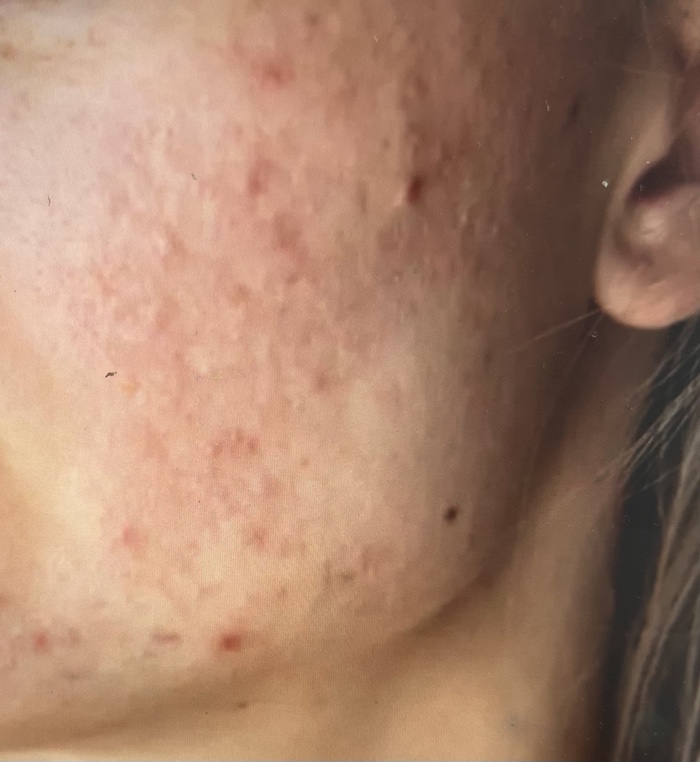
- Avoid using cleansers or moisturizers with fragrances.
- No makeup till you heals back
- Use Thermal spring water to calm the skin (Try from La Roche Posay)
- Take cold showers or ice your face (wrapped in a thin cloth). Avoid hot showers at any cost.
- Don’t use any exfoliating fancy gadgets to wash your face, simply hands.
- Give a lot of moisture & hydration to the skin for it to feel better. Like moisturizers loaded with ceramides (Helps in skin barrier) & Hyaluronic acid.
- Now, seal the skin with a light layer of Vaseline. It locks in all the goodies we’ve given & heals the skin faster.
- Stop using any other exfoliants, acids, AHAs, BHAs, peroxides, salicylic acid, or vitamin C until you are completely healed.
- Glycerin & Aloe vera, both are great soothing & calming agents for the skin
- Product suggestion – Try Avene- Cicalfate + restorative protective cream
- DO NOT forget to apply sunblock before stepping outside. Your skin is already in a vulnerable state. UV rays can make it worse.
Retinol usage results
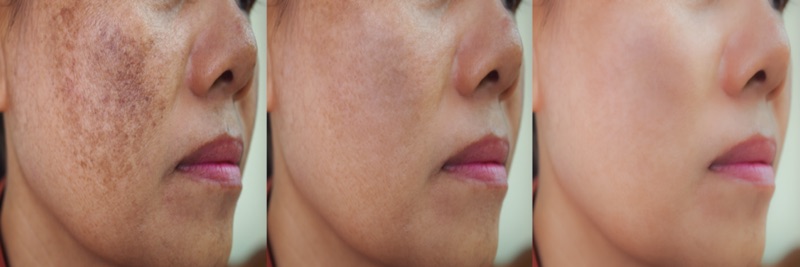
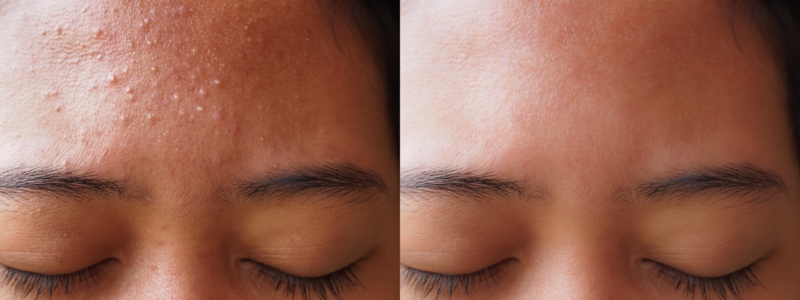
Does the Packaging of Retinol Products matter?
Yes! Retinol Products are very unstable and sensitive in nature; hence Retinol packaging is literally everything, which surprisingly very few people know of. Air Exposure means Retinol death. So read on.
There are 4 types of packaging in the market:
- Tubes (Best)
- Pump bottles (Better)
- Serum bottles (Okay)
- Jars (NAH)
Tubes are undoubtedly the best and the safest form to use Retinol products. Retinol, when stored properly in tubes, has a much longer shelf life than other packaging. Beware of the Jars with those big lids. They don’t make sense at all.
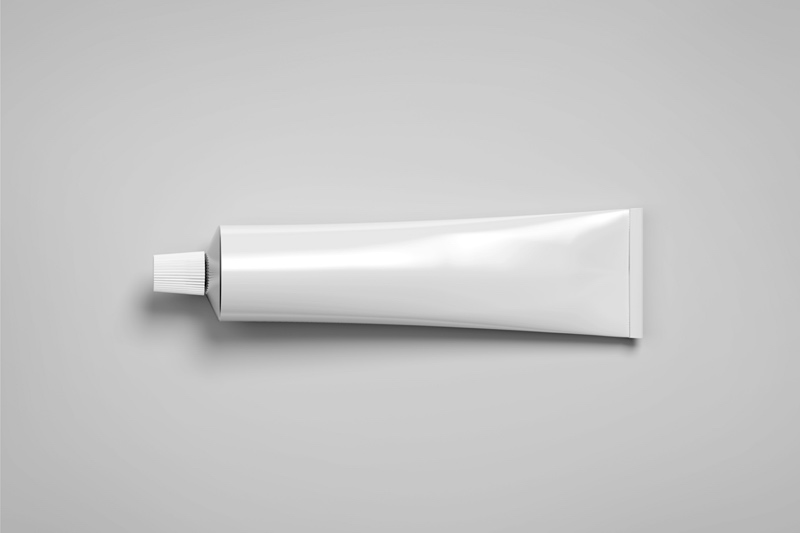
Does the storage condition of Retinol matter?
Very much, Retinol is not a stable ingredient in nature & perhaps it likes staying in cool, dark places. Quite away from Sunlight, to maintain its shelf life. Hence, your bathroom cabinets work just fine.
Brand Recommendations for Retinol
Takeaway
Retinol and Vitamin C – Should this combination be used together?
NOPE! Retinol and Vitamin C should not be used together at the same time in your skincare routine because of extreme differences in PH levels. Applying Retinol and Vitamin C together at the same time can over-peel the skin and cause major skin irritation or even burns.
Although, both ingredients can be used together on the same day in your skincare routine. Vitamin C is superb for daytime use and Retinol is perfect to use at nighttime. This daily skincare routine will work wonders for your skin.
& don’t forget to load on sunscreen in the daytime guys!!
Love~ Beauty Stroll
A few related Articles
If you loved reading this article, you will probably also enjoy reading:
- Can you use Glycolic Acid with Retinol?
- Should you apply Retinol before or After Moisturizer
- Can you use Benzoyl Peroxide with Retinol?
- Can you use Azelaic Acid and Retinol Together
- Can you use Retinol And Hyaluronic Acid Together?
- Can you use Niacinamide with Retinol?
- Can you use Salicylic Acid and Retinol Together?
References
- https://www.mountsinai.org/health-library/supplement/vitamin-a-retinol
- https://www.health.harvard.edu/blog/why-is-topical-vitamin-c-important-for-skin-health-202111102635#:~:text=Skin%20benefits%20of%20vitamin%20C,overall%20skin%20texture%20and%20appearance.
- https://www.ncbi.nlm.nih.gov/pmc/articles/PMC3673383/
interesting post thank you